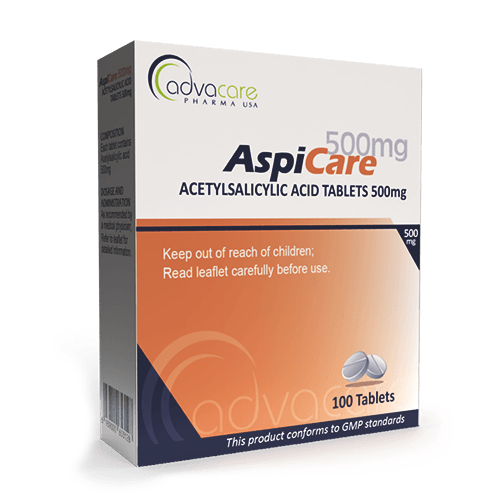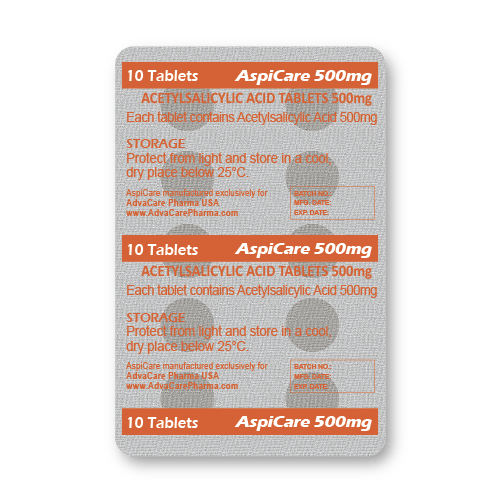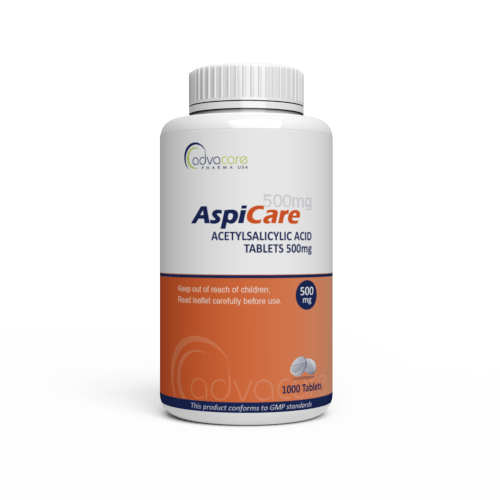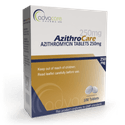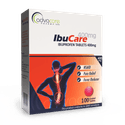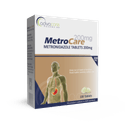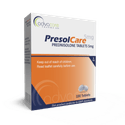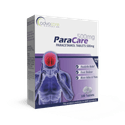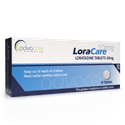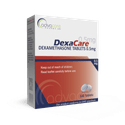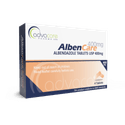- Home›
- Pharmaceuticals›
- Pharmaceutical Tablets›
- Acetylsalicylic Acid Tablets
Acetylsalicylic Acid Tablets
Dosage
Packaging
What is Acetylsalicylic Acid?
Active Ingredients: Acetylsalicylic Acid
Acetylsalicylic Acid Tablets are a nonsteroidal anti-inflammatory (NSAID) drug that is used to relieve mild to moderate pain. This medicine is used to treat symptoms of generalized aches and pain, rheumatoid arthritis, angina, fever, headaches and migraines, and myocardial infarction.
Acetylsalicylic acid is also known by the name of aspirin. This drug is classified as a salicylate, which has analgesic, antipyretic and anti-inflammatory properties. It can also be used as an antiplatelet because of the active ingredient's ability to interrupt the formation of bodily thromboxane and platelet aggregation.
AdvaCare Pharma is a trusted global distributor of Acetylsalicylic Acid Tablets. Our company offers a wide selection of high-quality and cost-effective medical products. These products are manufactured in factories located in China, India, and the USA. These facilities are regularly inspected to ensure they meet GMP certification requirements.
Why are we a leading Aspirin manufacturer?
As a reputable Aspirin manufacturer, also referred to as Acetylsalicylic Acid, we are dedicated to ensuring that GMP guidelines and standards strictly apply to the manufacture of our entire range of 200+ pharmaceutical treatments in tablet dosage form.
AdvaCare Pharma is an American pharmaceutical company committed to the manufacture of high-quality, affordable pharmaceuticals for a global market. The extensive international network that we partner with includes pharmaceutical distributors, hospitals, pharmacies, and a variety of other medical institutions. Our vision is to manufacture Aspirin Tablets, and other quality-assured oral solid treatments, that get into the hands of those that need them most.
Uses
What is Acetylsalicylic Acid used for?
It is used to reduce pain, inflammation, and fever. It is also used to treat certain inflammatory conditions, such as rheumatic fever.
Acetylsalicylic Acid is also given after a heart attack to decrease the risk of death and as a long-term care medication to reduce the risk of myocardial infarction, stroke, and blood clots.
How are Acetylsalicylic Acid Tablets used?
This medication is intended to be taken orally. Each tablet should be taken with a full glass of water or at meal time, in order to reduce gastrointestinal side effects.
How should Acetylsalicylic Acid Tablets be stored?
This medication should be kept in its original packaging until use. The tablets should be stored in a dry location at room temperature. Do not use the tablets past their expiry date. If a tablet has a scent similar to strong vinegar, it should be discarded.
What dose should be taken?
Adult Dosing Dosage may vary based on different medical indications:
- For pain or fever, the usual dose is 300-600mg taken every 4-6 hours, as needed. The maximum dosage is 4g per day.
- For acute coronary syndrome, the usual dose is 162-325mg taken once per day.
- For MI prevention, the usual dose is 81-325mg taken once per day.
- For TIA/thromboembolic stroke prevention, the usual dose is 75-325mg taken once per day.
- For arthritis (off-label), the usual dose is 2.6-5.4g per day, divided and taken every 4-6 hours.
- For preeclampsia prevention (off-label), the usual dose is 81mg, taken once per day. Treatment should begin at 12-28 weeks of gestation and continue until delivery.
- For rheumatic fever (off-label), the usual dose is 5-8g per day, divided and given every 4-6 hours for 1-2 weeks. Then the dose should be tapered over the following 2-8 weeks.
Renal Dosing The guidelines for adult patients with renal impairment are as follows:
- CrCl < 10: The use of this medicine should be avoided.
- HD: No adjustment is necessary on dialysis days, and the medicine should be given after dialysis. No supplement is required.
- PD: The use of this medicine should be avoided.
Hepatic Dosing There are no defined guidelines for the use of this drug in patients with hepatic impairment.
Pediatric Dosing The recommendations for dosage adjustments for children are as follows:
- For pain or fever, the usual dose is 10-15mg/kg per dose, given every 4-6 hours as needed. The maximum dosage is 60-80mg/kg per day.
- For juvenile idiopathic arthritis (off-label), the usual dose is 60-100mg/kg per day, divided and taken every 6-8 hours. The starting dose should be 60mg/kg per day, divided and taken every 6-8 hours. Then the dose may be increased by 10-20mg/kg per day every 5-7 days. The maximum dosage is 100mg/kg per day.
- For Kawasaki disease (off-label), the usual dose is 80-100mg/kg per day, divided and given every 6 hours. After the resolution of fever, the dose should be decreased by 3-5mg/kg per dose each day. The total duration of treatment is 8 weeks.
- For the prevention of thrombotic events (off-label), the usual dose for children over 2 years old is 1-5mg/kg per dose, taken once per day. The maximum dosage is 325mg per day. It is advised to consult local guidelines or institution protocols for information on the appropriate use of this medicine in pediatrics.
Renal Dosing for children The guidelines for pediatric patients with renal impairment are as follows:
- CrCl < 10: The use of this medicine should be avoided.
- HD: No adjustment is necessary on dialysis days, and the medicine should be given after dialysis. No supplement is required.
- PD: The use of this medicine should be avoided.
Hepatic Dosing for children There are no defined guidelines for the use of this drug in patients with hepatic impairment.
Refer to a doctor or pharmacist for guidelines on dosage. Do not exceed what they advise.
Who can use Acetylsalicylic Acid?
Acetylsalicylic Acid Tablets can be given to adults and children, but caution is advised for specific groups of patients.
Pregnant Low-dose Acetylsalicylic Acid is appropriate to use for pregnant women. The benefits must be weighed against the risks of the use of full-dose Acetylsalicylic Acid in women at 20-29 weeks gestation. If used, it is advised to limit the dose and duration and monitor amniotic fluid if the pregnant woman is using it longer than 48 hours.
Full-dose Acetylsalicylic Acid should be avoided starting at 30 weeks gestation. Based on human data with full dosage, there is a risk of fetal harm that begins at 20 weeks gestation, including renal dysfunction and oligohydramnios, a risk of premature fetal ductus arteriosus closure beginning at 30 weeks, and an increased risk of excessive blood loss during labor and delivery. These risks have not been reported with low-dose Acetylsalicylic Acid use.
Breastfeeding When used as an analgesic, the benefits of full-dose acetylsalicylic acid must be weighed against the risks. It is advised to avoid full-dose treatment if the nursing infant is suffering from a viral infection. Though there is inadequate human data, there is a possible risk of bleeding, thrombocytopenia, and metabolic acidosis. No human data is available to properly assess the effects of this drug on milk production.
Children Though the use of this drug is considered safe in children over 3 years old, it is important to note that Acetylsalicylic Acid Tablets should not be given to children who have symptoms of a viral infection like flu or chickenpox. The use of Acetylsalicylic Acid in children has been linked to Reye’s syndrome, particularly in children who have had a recent viral infection.
Geriatric The use of Acetylsalicylic Acid is generally considered safe for elderly patients but may be more likely to experience adverse effects. It should be noted that according to recent studies, this population has up to a 20% increased risk of anemia.
Other warnings
If tinnitus develops, therapy with Acetylsalicylic Acid should be discontinued.
As there is an increased risk of bleeding associated with this medicine, it is advised to express caution for those with conditions such as anemia, GI malabsorption, peptic ulcer history, gout, liver or kidney disease, vitamin K deficiency, alcoholism, renal calculi, thyrotoxicosis, hypochlorhydria, or hypoprothrombinemia.
Side Effects
As with all pharmaceuticals, some unwanted effects can occur from the use of Acetylsalicylic Acid Tablets.
Common side effects include, but may not be limited to:
- upset stomach
- heartburn
- drowsiness
- mild headache
Seek medical attention if the following develop:
- ringing in the ears
- confusion or hallucinations
- rapid breathing
- seizure
- severe nausea or vomiting
- stomach pain
- bloody or tarry stools
- coughing up blood
- fever lasting longer than 3 days
- swelling or pain lasting longer than 10 days
For a comprehensive understanding of all potential side effects, consult a medical professional.
If any symptoms persist or worsen, or you notice any other symptoms, please call your doctor immediately.
Precautions
Do NOT use Acetylsalicylic Acid (Aspirin) Tablets if:
- You are allergic to any of the ingredients.
- You have ever had an asthma attack or severe allergic reaction taking aspirin or an NSAID.
- You have a history of stomach bleeding or intestinal bleeding.
- You have a bleeding disorder such as hemophilia.
Before treatment, consult your doctor regarding any medications you are taking to address potential drug interactions.Some medications may need to be changed or switched due to increased risks of side effects. Some known interactions include NSAIDs (ibuprofen, ketoprofen, indomethacin, meloxicam, mefenamic acid, naproxen, etc.) antibiotics (e.g. amikacin), mifepristone, ramipril, and diuretics (e.g. acetazolamide). This is not a complete list.
This drug is contraindicated with abrocitinib, dichlorphenamide, ketorolac, influenza nasal vaccine (live), and varicella vaccine (live). Some medications may need to be changed or switched due to an increased risk of side effects.
This medication may not be suitable for people with certain conditions, so it is important to consult with a doctor if you have any health conditions.
Acetylsalicylic Acid Tablets are contraindicated with the following conditions: asthma (ASA-induced, NSAID-induced), urticaria (ASA-induced, NSAID-induced), GI ulcers with bleeding, hemorrhoids, hemorrhagic diathesis, nasal polyps due to asthma, sarcoidosis, thrombocytopenia, ulcerative colitis, hemophilia G6PD deficiency, uncontrolled hypertension, CrCl < 10 in patients not on hemodialysis, and peritoneal dialysis.
References
Aspirin and cancer treatment: systematic reviews and meta-analyses of evidence: for and against
This is a meta-analysis of 118 observational studies that have consistently shown a roughly 20% reduction in mortality associated with aspirin use among cancer patients.
The conclusion is that aspirin is a safe drug and has favorable effects in patients with cancer. Ethical considerations suggest that cancer patients should be informed about the available evidence regarding aspirin and encouraged to discuss this option with their healthcare providers.
The story of Aspirin – a versatile medicine with a long history
A general practitioner, Laurence Craven, recommended aspirin for patients aged 45-65 who are at risk of heart attacks due to weight or a sedentary lifestyle in his research that was performed in 1950s. According to the research, patients who took aspirin did not experience myocardial infarctions (MIs) or strokes.
Other findings indicate the following:
- Richard Peto (1980): Published a meta-analysis of six trials, showing a 23% reduction in vascular disease mortality for those taking aspirin.
- ISIS-2 (1988): Demonstrated the benefits of aspirin after a heart attack, leading to its standard use in suspected MI cases.
- Physicians Health Study (1988): Provided evidence that long-term low-dose aspirin reduces the risk of MI and aids in the primary prevention of ischemic heart disease.
- Antiplatelets Trialist Collaboration (1994): Confirmed aspirin's role in preventing further cardiovascular events and deaths in people with established vascular disease.
- Antithrombotic Trialist Collaboration (2002): Published a meta-analysis showing aspirin's antiplatelet effects and its role in preventing death, MI, and stroke in high-risk patients.
- US Preventive Services Task Force (2009): Recommended aspirin for primary disease prevention in certain groups based on its preventative effects against cardiovascular disease and cancer.
- 2020 Study: Reaffirmed that aspirin remains one of the best options for the secondary prevention of cardiovascular disease.
Aspirin in Cancer Prevention and Management:
- Professor Gabriel Kune (1988): Observed a 40% lower risk of developing large intestine cancer in people taking aspirin.
- Sir John Burns (2011): Aspirin helps prevent cancer in carriers of hereditary colorectal cancer.
The conclusion from this analysis is that an individualized approach is crucial, considering factors such as age, risk factors, platelet turnover in conditions like diabetes, and body weight, which can affect aspirin's effectiveness.

You might be interested in...
Why AdvaCare Pharma?
As an industry leader, we are aware of our responsibility to provide affordable and sustainable solutions to improve healthcare worldwide.
